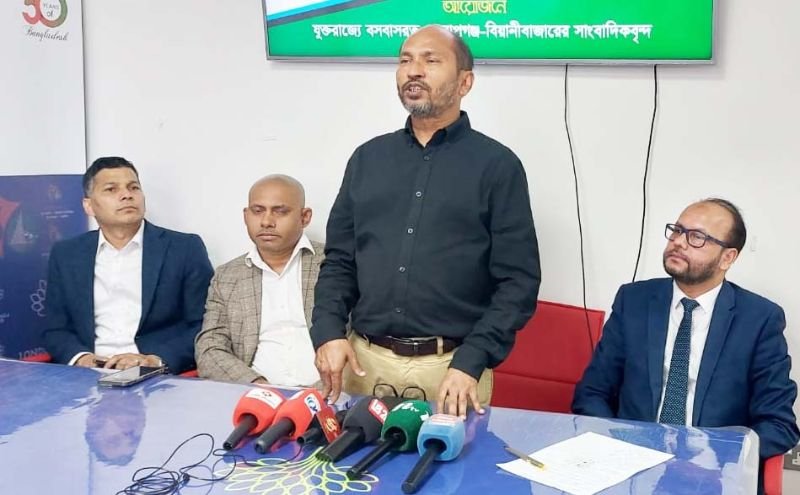BRAC Saajan opens its office in Dhaka
প্রকাশিত হয়েছে : ১৫ মে ২০১৭
 Dhaka correspondent: BRAC Saajan Exchange Ltd, the UK-based subsidiary of BRAC Bank Limited, opened its Dhaka office in providing state of the art customer services for inward remittances. Sir Fazle Hasan Abed, KCMG, Chairperson, BRAC, and Chairman, BRAC Bank Limited, formally inaugurated the office at Gulshan Badda link Road in Dhaka on May 03, 2017.
Dhaka correspondent: BRAC Saajan Exchange Ltd, the UK-based subsidiary of BRAC Bank Limited, opened its Dhaka office in providing state of the art customer services for inward remittances. Sir Fazle Hasan Abed, KCMG, Chairperson, BRAC, and Chairman, BRAC Bank Limited, formally inaugurated the office at Gulshan Badda link Road in Dhaka on May 03, 2017.
Mr. Kazi Mahmood Sattar, Chairman of BRAC Saajan and Independent Director of BRAC Bank, Mr. Selim R. F. Hussain, Managing Director & CEO and Director of BRAC Saajan, BRAC Bank, Mr. Abdus Salam, Founder Managing Director & CEO, BRAC Saajan and senior officials from BRAC Bank and BRAC Saajan were also present. The offshore office will provide 24/7 customer service to the Bangladeshi expatriates in the United Kingdom and for other European expatriate Bangladeshis. BRAC Saajan (BSEL) is one of the largest and the most profitable Bangladeshi Payment Institutions in the UK. BSEL in fact is working hard for the expatriate Bangladeshis in sending remittance through legal channels, through secured way and at a competitive cost.
Founded in 2003 by Mr. Abdus Salam as Saajan Worldwide Money Transfer Limited and based in Birmingham, in 2011 BRAC Bank Limited acquired 75% shareholding of the Company. During last year, BRAC Saajan remitted US$ 225 million to Bangladesh.
International Remittance, contributing more than 15% of the GDP, plays a pivotal role in the development of Bangladesh. Bangladesh receives more than US$ 15 billion a year from its expatriates and a major part of this is coming from the United Kingdom. UK is a prolific country of remittance for Bangladesh ranking 6th in terms of volume. Today BSEL is one of the leading Payment Institutions in the UK remitting more than 32% of total remittance from there to Bangladesh.
With the help of Mr Salam’s visionary leadership and BRAC Bank’s institutional strength, BRAC Saajan witnessed phenomenal growth since 2011. BSEL is the first Bangladeshi Payment Institutions to be granted as Authorized Payment Institution (API) from Small Payment Institution (SPI) by the Financial Conduct Authority (previously known as Financial Services Authority) in 2013, the UK Payment Institutions watchdog.
The authorization from the Financial Conduct Authority, allows the company to expand its remittance services in other European countries, where about 1.3 million NRBs resides who contribute to US$ 1.3 billion to foreign exchange reserve.
At present, BSEL Transfers money to 6 countries (Bangladesh, India, Pakistan, Sri Lanka, Poland, Romania) from 7 countries through its agents located in UK, Ireland, France, Spain, Greece, Italy and Portugal.
It can be stated that BRAC Saajan is empowering Bangladeshi expatriates through smooth remittance and investment opportunities. In near future, it will bring more innovative investment products for NRBs contributing to development of Bangladesh.
Achievements of BRAC Saajan Exchange Ltd.
As on April 2017, BSEL has got 350 agents in UK & Europe and 2 branches and 1 HO in Birmingham, UK, and 1 wholly owned subsidiary in France. BSEL also have representative office in Italy and Spain. In addition to having direct integration (transfer in bank accounts, 10 min. service) with BBL since 2011, BRAC Saajan established direct integration with 2 other major banks; Islami Bank Bangladesh Ltd (IBBL) and Uttara Bank Ltd (UBL) in 2015. To offer convenience to the remitters, BSEL has launched its Online Transaction Portal last November. The remitters can now send remittance to their beneficiaries 24/7, without visiting any Branch or Agent location. To offer security to its customers, BSEL has also introduced a Pre-paid Master Card. The cardholder of this Pre-paid card can top-up the card, and can use at any POS worldwide where the Master Card logo is there.
Strategic plans of BSEL (Thinking forward for future opportunities):
In order to be competitive and also to realize the vision into reality; BSEL have taken the following strategies for the next three years:
- Having direct integration with the leading banks of the beneficiary countries.
- Expanding its footprints into Europe, Africa and Asia.
- Increasing the beneficiary countries across Asia, Africa, Southern America and Australia.
- Increasing aggregators business through bilateral agreements.
- Introducing other financial products.




